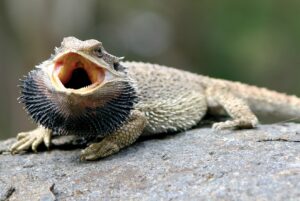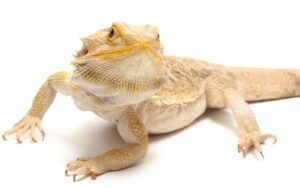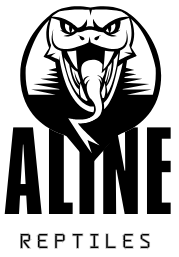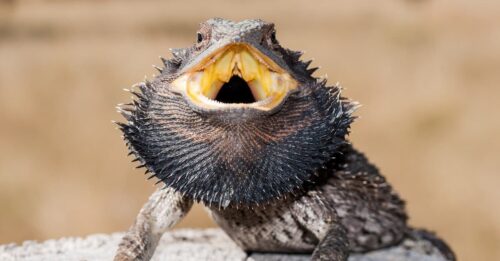In this comprehensive guide, we’ll explore everything you need to know about why your bearded dragon puffs up, how to interpret the behavior, and what you can do about it. Whether you’re a new bearded dragon owner or an experienced reptile enthusiast, understanding this unique behavior is crucial for keeping your pet healthy and happy.
Why Do Bearded Dragons Puff Up?

One of the first things every bearded dragon owner should understand is that puffing up is a common and natural behavior. It’s a vital part of how these reptiles communicate and defend themselves.
A Defense Mechanism
When a bearded dragon feels threatened or encounters a situation it doesn’t like, it will puff up its beard and throat area. This is typically done to make the dragon appear larger and more intimidating. This defensive puffing is part of their instinctual behavior aimed at warding off predators or any other perceived threats.
For instance, when confronted by another male bearded dragon, the puffing is a way to establish dominance or show aggression. This is particularly noticeable in the wild, where bearded dragons may face predators or other males competing for territory.
Mating Behavior or Territorial Display
During breeding season, puffing up can also be seen as part of the courtship ritual or a way to display dominance. Male bearded dragons will often puff up their beards to attract females or ward off rival males. It’s essentially a way of showing off their size and strength.
In the wild, bearded dragons use their puffed-up behavior as a non-aggressive way to maintain their territory, especially during mating season. The visual of a puffed-up beard sends a clear message to others that the area is claimed.
Stress and Discomfort
Unfortunately, puffing up can also be a sign of stress or discomfort. This could be caused by factors like:
- Poor environmental conditions: Unfavorable tank temperature, humidity, or lighting.
- Handling stress: Over-handling or rough treatment can make your pet anxious.
- Changes in the environment: A new pet or a sudden change in the living space can cause distress.
The good news is that stress-related puffing is often temporary and can be resolved by improving your pet’s habitat or reducing handling.
Is Puffing Up a Sign of Stress or Illness?
As a pet owner, it’s essential to distinguish between normal puffing and puffing caused by illness or stress.
Stress-Related Puffing
Stress can manifest in a number of ways, and puffing up is one of the most obvious signals that your bearded dragon is feeling uneasy. Here are a few stress-related causes of puffing:
- Improper tank conditions: Bearded dragons are very sensitive to their environment. If the tank is too hot or cold, or the humidity is not regulated, your pet may start puffing up in response.
- Lack of proper space: If your bearded dragon feels crowded or its tank is too small, it may puff up to make itself feel more secure.
- Unfamiliar surroundings: A move to a new tank or environment can stress your dragon, making it more likely to puff up.
- Presence of other animals: Bearded dragons are territorial creatures. The introduction of a new pet or another bearded dragon can cause your pet to puff up in an attempt to assert dominance.
If the puffing is accompanied by other signs of stress, such as refusal to eat, hiding frequently, or lethargy, this may indicate a more serious issue.
Signs of Illness
Puffing up in combination with other concerning symptoms—such as lack of appetite, abnormal shedding, or diarrhea—might indicate illness. It’s important to monitor your pet’s overall health and consult a vet if puffing seems unusual or persistent.
What Does Puffing Up with Blackened Beard Mean?

One of the most noticeable signs in a bearded dragon when it’s puffing up is the blackening of its beard. When your dragon’s beard turns black, it’s often a sign of heightened stress or aggression.
Aggression or Territorial Behavior
The blackening of the beard, especially when puffed up, is a clear sign of aggression or territorial behavior. In the wild, bearded dragons use this as a warning sign to other males. The combination of puffing up and a darkened beard sends a message: “Stay away, this is my territory.”
If your bearded dragon exhibits this behavior around another male or when there’s a perceived threat, such as a new pet or an unfamiliar human, it’s important to give them space. Prolonged exposure to stressful situations can cause chronic stress in your pet, so ensure their environment is as calm and stable as possible.
Should You Be Concerned?
If the blackened beard is brief and happens in an obvious situation like a territorial dispute, there’s no need to worry. However, if your bearded dragon’s beard remains dark or they are constantly puffing up with this coloring, it might be a sign of ongoing stress or frustration. Consider addressing the factors causing it, such as re-arranging the tank or introducing new animals slowly.
Puffing Up and Flattening Out: What Does It Mean?
Sometimes, bearded dragons don’t just puff up their beards—they also flatten out their bodies. This is another form of posturing that can tell you more about your pet’s current state of mind.
Displaying Size for Dominance
Flattening out with puffing up is an effort to appear larger. In the wild, this behavior serves to intimidate other animals. When threatened, a bearded dragon will make itself look as big as possible to appear formidable.
If your bearded dragon is puffing up and flattening out when near another pet or during a time of stress, it’s likely trying to assert dominance or defend itself.
Is Puffing Up Normal for Bearded Dragons?
Now that we’ve covered the various reasons for puffing up, it’s important to reassure bearded dragon owners that, in many cases, puffing up is perfectly normal.
Normal Puffing Behavior
Bearded dragons puff up regularly, especially during the mating season or when they encounter another bearded dragon. This is a natural part of their behavior and should not be a cause for alarm unless it’s accompanied by signs of distress or illness.
If your bearded dragon puffs up during interaction with another pet or while exploring new areas, this could just be part of their natural behavior. However, if puffing up is coupled with other worrying signs, it may indicate an underlying issue.
How to Stop or Reduce Puffing Up

If you notice your bearded dragon puffing up more frequently than usual, it’s worth investigating whether environmental or behavioral adjustments need to be made.
Addressing Environmental Stressors
One of the easiest ways to reduce stress in your pet is by ensuring that their habitat is ideal. Here’s a quick reference table:
| Factor | Ideal Conditions | What Happens If It’s Wrong |
|---|---|---|
| Temperature | 75°F-85°F during the day, cooler at night | Stress, inactivity, health issues |
| Lighting | UVB lighting for 10-12 hours a day | Poor digestion, lack of vitamin D |
| Humidity | 30%-40% | Skin issues, dehydration |
| Tank Size | Minimum 40-gallon tank | Crowded space, stress |
Minimize Handling Stress
While bearded dragons enjoy interaction, too much handling or rough handling can make them anxious. Limit handling to short periods, and be gentle with them. Over time, your pet will become more comfortable with human interaction and less likely to puff up out of stress.
Health Checks and Vet Visits
If you’re noticing frequent puffing or blackened beard that doesn’t resolve with environmental changes, it’s time to visit a reptile vet. They can rule out underlying health problems and offer guidance for managing your pet’s stress.
Handling Bearded Dragon Puffing Up in Multi-Pet Households
If you have other pets at home, such as other reptiles, dogs, or cats, the presence of unfamiliar animals can cause your bearded dragon to puff up. Bearded dragons are naturally territorial creatures, and the introduction of new pets can provoke territorial behaviors.
Minimizing Stress with Other Pets
Here are some steps you can take:
- Separate tanks: If you have multiple reptiles, keep them in separate tanks.
- Slow introductions: Introduce new animals gradually, allowing your bearded dragon to adjust.
- Observe behavior: Keep an eye on interactions between your pets to ensure that no one is stressing out your bearded dragon.
How to Care for a Bearded Dragon That Puffs Up Frequently
If your bearded dragon is puffing up often, it’s crucial to create a supportive environment that reduces stress. Here’s how you can help:
- Provide a consistent habitat: Keep their living space stable and comfortable.
- Limit handling: Give your dragon plenty of time to acclimate to its environment.
- Health checks: Ensure your pet is free from illness or parasites that might be contributing to stress.
- Proper nutrition: A healthy diet rich in vegetables, insects, and proper vitamins will help keep your dragon feeling its best.
Conclusion
This page covers more you need to know about Bearded Dragon Puffing Up. Understanding your bearded dragon’s behavior is key to providing it with the best care. While puffing up can be a sign of aggression, stress, or mating rituals, it’s usually a natural response. By paying attention to the context in which it happens, you can make sure your pet is not only healthy but also happy.
With the right care, your bearded dragon will continue to thrive, and you’ll be able to enjoy its quirky behaviors with greater insight and understanding. Always remember that observing your pet’s habits closely is one of the best ways to ensure a long, healthy life for your scaly friend.

